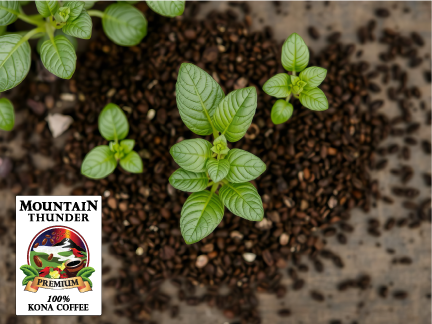We love to use our used coffee grounds for gardening in Hawaii. They are fantastic for creating nutrient-rich soil, and keeping them out of the waste stream feels good. Filters decompose quickly, so we often use them in our gardens, too!
Here are ten ways to use your Kona Coffee grounds in your home and garden.
🌱 1. Soil Amendment
Mix grounds into your garden soil to improve drainage, water retention, and aeration. They're perfect for clay-heavy soils. On Hawaii Island, we have very little topsoil, so mixing coffee grounds with mulch store-bought soil makes a big difference.
🌿 2. Fertilizer Boost
Sprinkle your Kona Coffee grounds around your plants or mix them into the top layer of soil. Coffee grounds are rich in nitrogen and add trace minerals like potassium and magnesium.
🌸 3. Compost Ingredient
Toss them into your compost pile. They're considered a “green” compost material (high in nitrogen), so balance them with “browns” like dried leaves or cardboard.
🐌 4. Pest Deterrent
Scatter grounds around plant bases to help deter slugs, snails, and even ants. The texture and caffeine are believed to repel them.
🪴 5. Mulch Alternative
Layer a thin amount around plants as mulch—but mix with other organic material like leaves or straw to avoid compacting.
🌺 6. Acid-Loving Plant Friend
Add directly to the base of acid-loving plants like:
-
Hydrangeas
-
Azaleas
-
Rhododendrons
-
Camellias
-
Blueberries
🌼 7. Worm Food
Worms love Kona Coffee grounds! Add them to worm bins to help keep your composting worms happy and productive.
🌾 8. Seed Starter Boost
Mix Kona Coffee grounds with potting soil for seedlings. Just use a small ratio to avoid acidifying the mix too much.
🍄 9. Grow Mushrooms
Used grounds are a great medium for growing certain mushrooms like oyster mushrooms—nutrient-rich and already pasteurized by brewing!
🌍 10. Natural Weed Blocker
Mix the grounds with water to create a slurry, and pour it in garden paths or between pavers to help suppress weeds while improving the soil below.
So, the next time you're thinking of dumping your coffee grounds in the garbage, consider using them in your garden.





